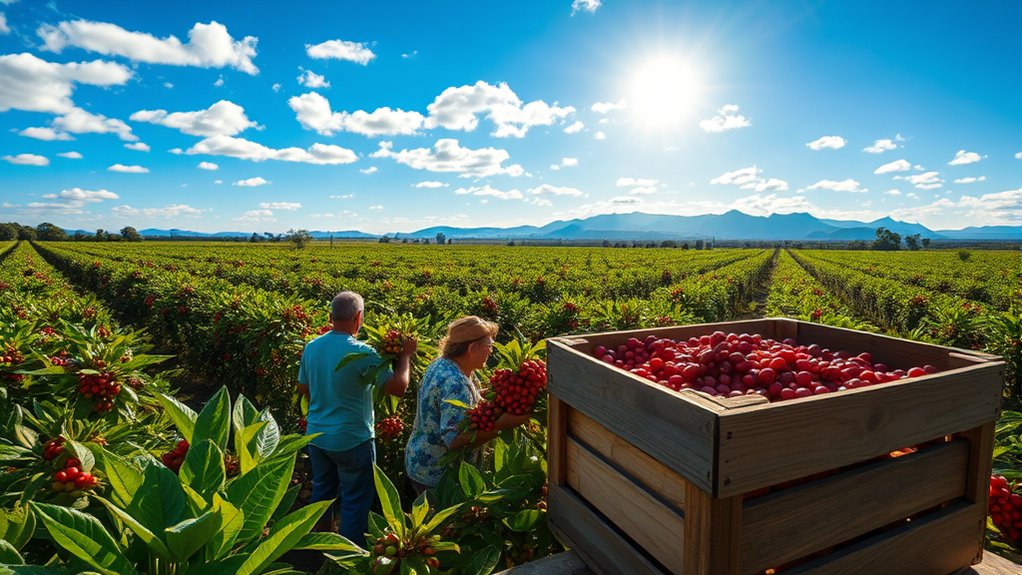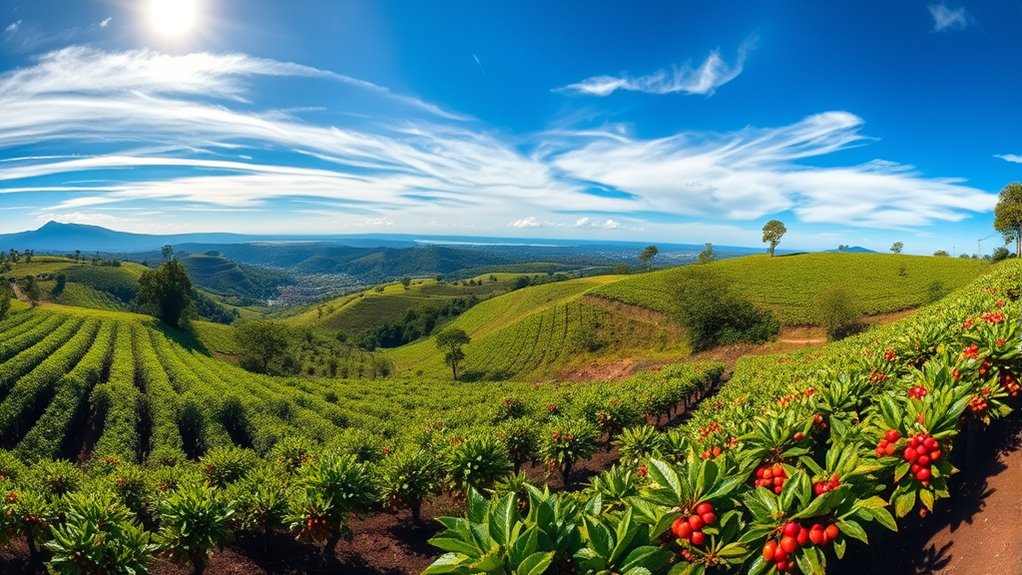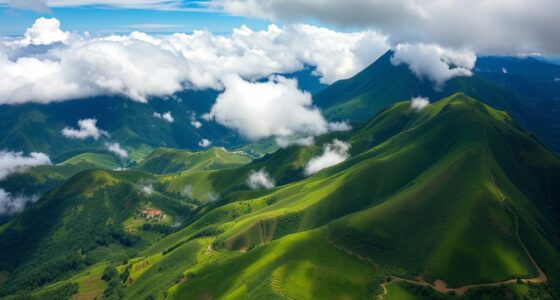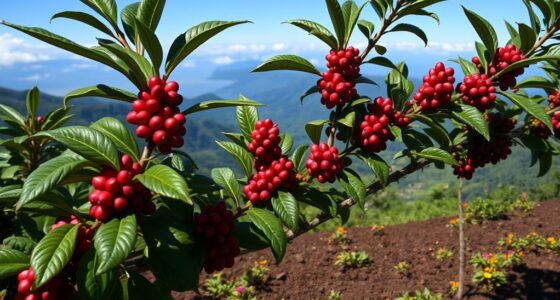Brazil is the world’s largest coffee producer, controlling about 80% of global exports at its peak. Its rich history, ideal climate, and vast plantations in regions like Minas Gerais and São Paulo support high-quality Arabica beans. Brazil’s combination of natural advantages and constant innovation helps maintain its dominance. If you want to discover how these factors shape Brazil’s coffee excellence and global influence, there’s much more to explore underneath the surface.
Key Takeaways
- Brazil produces approximately 80% of the world’s coffee exports, making it the largest coffee producer globally.
- The country’s ideal climate, fertile soils, and mountainous regions support high-quality Arabica coffee cultivation.
- Historically, Brazil’s coffee industry evolved from slave labor to modern, technologically advanced farming practices.
- Minas Gerais and São Paulo are key regions contributing to Brazil’s dominance in global coffee markets.
- Brazil’s focus on quality, innovation, and diverse flavor profiles sustain its leadership in the coffee industry.

Have you ever wondered what makes Brazilian coffee so renowned worldwide? It all begins with Brazil’s status as the largest producer of coffee on the planet. The country’s coffee industry in Brazil has a long, storied history that dates back to 1727 when Francisco de Melo Palheta smuggled coffee seeds from French Guiana. This act sparked a coffee cultivation boom, transforming Brazil into a global powerhouse.
Today, Brazilian coffee dominates international markets, with the country controlling roughly 80% of the world’s coffee export at its peak. This dominance isn’t accidental—it’s rooted in the country’s natural advantages and extensive coffee farms spread across diverse regions.
Brazil’s climate and terrain are perfectly suited for growing high-quality Arabica coffee, which is prized for its rich, full-bodied flavors. The mountainous terrains and fertile soils in regions like Minas Gerais and São Paulo create ideal conditions for coffee cultivation. Minas Gerais, in particular, is considered the heart of the coffee industry in Brazil, producing some of the finest beans that are exported worldwide.
São Paulo also plays a crucial role, with its vast coffee farms contributing considerably to the country’s global reputation. Espírito Santo and Bahia are other key regions, each offering unique microclimates that produce distinct flavor profiles, adding to Brazil’s reputation for diverse coffee quality.
Throughout its history, the coffee industry in Brazil has evolved considerably. Initially relying heavily on slave labor until the abolition of slavery in 1888, the industry transitioned to employ European immigrant workers. This shift helped modernize coffee farms and improve production techniques, ensuring consistent quality and supply.
Today, coffee cultivation in Brazil is highly organized and technologically advanced, focusing on maintaining high standards of coffee quality. This commitment to quality has helped Brazilian coffee earn a premium among consumers worldwide.
The extensive network of coffee farms across Brazil supports a robust coffee export industry that sustains millions of livelihoods. The country’s natural conditions, combined with innovative farming practices, allow Brazil to produce a wide variety of Arabica coffee with exceptional flavor profiles, which are highly sought after globally.
According to global coffee production statistics, Brazil’s dominance in the coffee industry is expected to continue well into the future. When you enjoy a cup of coffee from Brazil, you’re tasting centuries of tradition, innovation, and ideal natural conditions that have cemented Brazil’s position as the world’s largest coffee producer. From the lush coffee farms of Minas Gerais to the bustling export hubs, Brazilian coffee continues to set the standard for quality and flavor worldwide.
Frequently Asked Questions
Which Country Is the Largest Producer of Coffee in the World?
You might wonder which country leads in coffee production. It’s Brazil, and it’s held that position for over 150 years. You can see its dominance through the 35% of global coffee it produces and exports, including around 2.2 million tons in 2022.
With millions working on small farms, Brazil’s influence extends worldwide, supplying key markets like the US, Germany, Italy, and Japan with both Arabica and robusta coffee.
What Is Brazil the Largest Producer of in the World?
You’re wondering what Brazil is the largest producer of in the world. Well, Brazil holds that title for coffee, producing about 35% of global coffee output annually.
With around 3.5 million metric tons of beans each year, it dominates the market. Its extensive plantations, advanced technology, and ideal climate help it supply nearly 40% of worldwide coffee, making Brazil the top global coffee producer.
What Is the Largest Producer of Coffee Company in the World?
You’re asking which company leads in coffee production globally. While many companies buy and sell coffee, the largest producer isn’t really a single company but a country—Brazil.
Brazil dominates the world’s coffee market, producing about 35% of all coffee. This massive output makes it the top “producer,” with millions of people working in its farms.
Is Brazilian Coffee the Best in the World?
You wonder if Brazilian coffee is the best in the world. While it’s known for its high quality, smooth, and nutty flavors, “best” is subjective.
Brazilian beans are widely appreciated and dominate global markets, but other regions like Ethiopia and Colombia also produce exceptional coffees with unique profiles.
Ultimately, it depends on your taste preferences, but Brazil’s reputation for consistency and quality definitely makes it a top contender.
Conclusion
As you explore the world of coffee, remember Brazil’s essential role as the largest producer. Its vast plantations, diverse flavors, and rich history make Brazilian coffee a true global staple. By choosing Brazilian beans, you’re experiencing a piece of the country’s passion and tradition. So, next time you sip your brew, think about the journey from Brazil’s lush farms to your cup—it’s a story worth appreciating every day.









